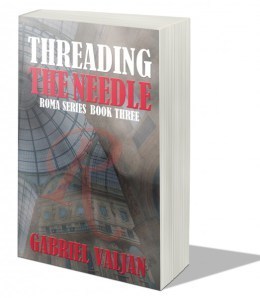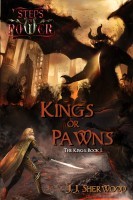Mayra Calvani's Blog - Posts Tagged "political-intrigue"
Interview with Gabriel Valjan, author of THREADING THE NEEDLE
 Gabriel’s short stories and some of his poetry continue to appear in literary journals and online magazines. Ronan Bennett short-listed Gabriel for the 2010 Fish Prize. Gabriel won first prize in ZOUCH Magazine’s inaugural Lit Bits Contest. Winter Goose Publishing publishes his Roma Series: Roma, Underground(February 2012), Wasp’s Nest (November 2012) and Threading the Needle(October 2013). Gabriel lives in New England.
Gabriel’s short stories and some of his poetry continue to appear in literary journals and online magazines. Ronan Bennett short-listed Gabriel for the 2010 Fish Prize. Gabriel won first prize in ZOUCH Magazine’s inaugural Lit Bits Contest. Winter Goose Publishing publishes his Roma Series: Roma, Underground(February 2012), Wasp’s Nest (November 2012) and Threading the Needle(October 2013). Gabriel lives in New England.
Website: http://gabrielswharf.wordpress.com/
Twitter: GValjan
Q: What’s inside the mind of a mystery/suspense author?
A: One of the joys of a good mystery is watching intelligent people being intelligent. This is difficult to write, since your protagonist has to be smart enough to spot something that neither the other characters nor your readers can see, even though it’s right in front of them. The fun part is unfolding the plot and juggling the characters, moving both forward at a good pace, while respecting your reader’s intelligence.
Q: Tell us why readers should buy Threading the Needle.
A: In this outing of the Roma Series, Bianca's curiosity gets a young university student murdered, but not before he passes her details of a secret weapon under development with defense contractor, Adastra. Within days, the media turns Farrugia, her backup at the scene, into hero, then suspect. Guilt may drive her to find justice for the slain Charlie Brooks, but she is warned by the mysterious Loki to stay away from this case that runs deep with conspiracy. In Threading the Needle, the third volume of the Roma series, Bianca must find a way to uncover government secrets and corporate alliances without returning Italy to one of its darkest hours, the decades of daily terrorism known as the “Years of Lead.”
The Roma Series is really about a group of friends -- all with their individual strengths and weaknesses – but committed to each other out of friendship, love, and respect. Gennaro is the senior investigator, crusty and cantankerous; but he is the voice of experience. Farrugia is the weathered but haunted detective, tempted to but disciplined enough not to sink to the level of the thugs he has known. There is Alessandro, young, intelligent, but libidinal and irresponsible at times. Dante, a promising investigator, is the romantic-love interest of the main character, Bianca, who is a forensic accountant on the lam from a secretive U.S. agency, Rendition. She is brilliant, a thrill-seeker, but extremely reserved, almost closed-off, which creates friction with Dante and the group. Then there is Loki, the mysterious go-between who contacts Bianca with cryptic advice and clues.
 Q: What makes a good mystery/suspense?
Q: What makes a good mystery/suspense? A: Plot and character, but not in that order. The plot has to be believable, but I’ve noticed that the trend in the mystery/suspense genre is to have the protagonist be flawed, which is fine, but many main characters border on unlikeable; they have addictions, family problems, or interpersonal issues, which can suspend belief. Bianca, my main character, is difficult at times, but she knows it and she knows why she is difficult and she is determined to fix it. Each mystery and each journey with her friends brings her closer to opening up, becoming a better person. Intimacy and trust frighten her.
Q: What is a regular writing day like for you?
A: I am a morning writer. I find that writing first thing in the morning when the mind is receptive is best for me. On a great morning, I’ll write twenty pages, but I average eight to ten pages. In terms of word count, accounting for standard formatting, I’d say that is 2,500 to 5,000 words a day.
Q: What do you find most rewarding about being an author?
A: Seeing my own development as a writer, whether it is the use of language, a time period, or particular format such as short fiction. With respect to the Roma Series, I’m taking chances in exploring complex subject matter or going deeper into the psychological motivations of my characters. Each character has blossomed with sufficient depth that they could be the main character of their own novel. In Threading the Needle, I confronted a difficult time in Italian history, one that I think few Americans know about but should, since terrorism and manipulating public opinion are relevant today. The challenge was presenting the information through two different cultural lenses: American and Italian.
Q: How did you celebrate the completion of your book?
A: I take a few days off before I start my next project.
-------------------------------------
Gabriel Valjan’s Author Page at Winter Goose Publishing: http://wintergoosepublishing.com/authors/gabriel-valjan/
Pinterest for Threading the Needle: http://pinterest.com/gvaljan/threadin...
Rachel Anderson of RMA Publicity represents Gabriel Valjan. Rachel can be reached at rachel@rmapublicity.comThreading the NeedleWasp's NestRoma, Underground
Published on October 28, 2013 11:10
•
Tags:
mystery, political-intrigue, spy, suspense
Interview with JJ Sherwood, Author of 'Kings or Pawns'

 On a cold winter night, wind howling into the desert sky, one ordinary hospital gave witness to a historic event. JJ Sherwood was born at 2:30 a.m. on December 31st, just barely managing to squeeze in to supplant New Year’s Eve. JJ has always had a flair for the dramatics.
On a cold winter night, wind howling into the desert sky, one ordinary hospital gave witness to a historic event. JJ Sherwood was born at 2:30 a.m. on December 31st, just barely managing to squeeze in to supplant New Year’s Eve. JJ has always had a flair for the dramatics.Sherwood began writing in the womb after a harrowing incident in which Mother Sherwood swallowed a pen—and thus, destiny was born. JJ’s first work was completed by the age of 5: a riveting tale of a duck attempting to climb into an apartment during the pouring rain. Unfortunately this book is not in print, but it served as the first spark that spurred on a lifetime of creativity.
Much of JJ’s childhood was spent tearing through the woods, playing out fantasy worlds, and tying Barbie to the roof so that the Power Rangers might rescue her. Middle and high school carried on this roleplaying, while college encompassed creating and refining over 250 characters in the world of Aersadore.
After escaping college, finally armed with the tools of the trade and a lifetime of development, JJ set to writing what would become the Steps of Power series: it was then that Eraydon slew his first dragon, Jikun battled the warlord Saebellus, and Taranus rebelled against his brother’s throne.
When not orchestrating the lives and deaths of the people of Aersadore, JJ’s hobbies include drawing, video gaming, wearing a bathrobe, and eating too many baked potatoes. JJ Sherwood lives in Cincinnati, Ohio with one loving and extremely patient spouse, a bearded dragon, a monk parakeet, and four cats who look far too similar.
Q: Congratulations on the release of your book, Kings or Pawns. To begin with, can you gives us a brief summary of what the story is about and what compelled you to write it?
A: As with any intrigue/suspense, the less you know, the better. The story is about an elven nation riddled with corruption and balanced on the brink of all out war with enemy warlord Saebellus. I have always loved the fantasy genre but have been disappointed by the lacking number of fantasy books geared for adults. Having grown up on Dragonlance, I always hoped to find a series as large and complicated, full of strong characters, set in a rich world, well-written, engaging, and enthralling—but geared for adults. So that’s what I write now.
 Q: What do you think makes a good fantasy? Could you narrow it down to the three most important elements? Is it even possible to narrow it down?
Q: What do you think makes a good fantasy? Could you narrow it down to the three most important elements? Is it even possible to narrow it down?A: Easy, actually: world-building, realism, and strong characters. I love the fantasy genre, and I believe those three things make or break fantasy.
World building is the scope, history, development, and strength of the world where all of the events and characters take place. Tolkien is a great example of a massive, fully developed history and world that allows readers to delve into a series and find themselves wonderfully lost within the depth of the world—and hungering for more.
Realism is the careful balance between fantasy and believability. In my case, I focus on realism to ensure non-fantasy readers can pick up and fall in love with the book. Even the magic systems—while retaining airs of fantasy— have a foundation of scientific understanding.
Strong characters is the last and possibly most important element—characters who rise above stereotypes and embed themselves into your memory… characters who drive and shape the story by their faults and strengths, heroics and mistakes. Characters whom you can fall in love with.
Q: How did you go about plotting your story? Or did you discover it as you worked on the book?
A: I plotted my story from bullet-point to bullet-point, but as the characters fully drive and shape the story, elements very often shift away from my original plan as characters argue that they “would not have done something quite that way”—and that single shift causes a ripple effect throughout the entire story ’til the end.
Q: Tell us something interesting about your protagonist and how you developed him or her. Did you do any character interviews or sketches prior to the actual writing?
A: There are multiple points of view and multiple protagonists, but I’ll address General Jikun—as his visage is most seen in our series artwork. Jikun was always an arrogant, cynical individual—just since the moment I began thinking he shaped himself that way—and I find once I write the first sentence of a character’s existence, the rest just… materializes and carries forward as though he’s always been a complete and full individual. I have little control over how the characters “create themselves.”
Q: In the same light, how did you create your antagonist or villain? What steps did you take to make him or her realistic?
A: Antagonists/villians have long since been some of my favorite individuals. I find that the most interesting and REAL characters are those that are not “good” or “evil” per se, but rather those characters who have “both traits.” Thus, my antagonist is simply an individual on one side of the coin, with admirable traits and flaws, making him an understandable, complicated, and interesting individual—and I prefer the same thought process with my “good” characters as well, including the aforementioned General Jikun.
Q: How did you keep your narrative exciting throughout the novel? Could you offer some practical, specific tips?
A: I wrote from several points of view and I focused on each point of view as being distinct and entertaining. For example, when writing from General Jikun’s point of view, I infuse a lot of dry humor, cynicism, and metaphors into the writing—readers know they are getting a skewed but unique view of events/characters/the world. Then the next point of view might be from the mute servant girl, Alvena, who is spunky, bubbly, and very optimistic—a stark opposite to General Jikun and a new, fresh look at everything going on. Keeping such strong characters and contrasting points of views allows readers to always feel like they are getting varying perspectives of the world/events/characters. Then they can begin to form their own passions, theories, and opinions: which means the readers can invest in the world and truly feel a part of it.
Q: Setting is also quite important and in many cases it becomes like a character itself. What tools of the trade did you use in your writing to bring the setting to life?
A: I have not read a lot of fantasy in years—and I consider this to be a strong suit. Instead, I focused on interesting studies in linguistics; Japanese; witchcraft, healing, & studies in secluded religions; forensics; astronomy; human anatomy; history; mythology; etc… This allowed me a unique, fresh take on the world not heavily influenced by other writers, but rather thoughts and ideas from cultures and humanity all over our world—and I’ve been developing it for nearly twenty years before the publication of the first novel. It has a history and life entirely its own.
Q: Did you know the theme(s) of your novel from the start or is this something you discovered after completing the first draft? Is this theme(s) recurrent in your other work?
A: The themes of the novels often develop organically based on the strengths and flaws of the characters in the series. In The Kings part of the Steps of Power series, each book has several themes within and the four book series will have an over-arching theme based on the growth and change of the characters involved.
Q: Where does craft end and art begin? Do you think editing can destroy the initial creative thrust of an author?
A: Editing perhaps can, but not in my experience. My editor only helps the series grow stronger—driving points and characters home. There are times we will disagree on what I define as an “artistic” touch (particular wording in a sentence that is done for artistic purposes and not just the “straight forward” information it could be written as), but at the end of the day, the author has the final say.
Q: What three things, in your opinion, make a successful novelist?
A: Determination, hard-work, and natural creativity.
Q: A famous writer once wrote that being an author is like having to do homework for the rest of your life. What do you think about that?
A: It is absolutely true. I have to read my book several times just to keep track of the cycles of the moon, consistencies in linguistics, history, dates, etc… I find myself constantly “studying” my own world and having to take notes about it. I even have calendar books filled with events just pertaining to an individual novel!
Q: Are there any resources, books, workshops or sites about craft that you’ve found helpful during your writing career?
A: Roleplaying. As strange and laughable it might sound to some people: roleplaying. Through roleplaying over the last (nearly) 20 years, I have developed the world, characters, and history of the world to a degree that many authors do not get to reach for years of writing novels and receiving feedback. By roleplaying online and in person with individuals all over the world, I can test history, characters, stories, etc… before they ever even make it into draft form. I can shape and change events for years before they ever touch the pages of a novel and yet not have to slow down the speed at which I write.
Q: Is there anything else you’d like to share with my readers about the craft of writing?
A: I edit my novels about thirty times before they ever end up in your hands—most of those edits involve adding and shaping nuances that allow you to really fall in love with the characters and the world. It is my favorite part of the writing process.
Published on October 22, 2015 06:09
•
Tags:
action, adventure, elves, epic, fantasy, political-intrigue, writing-craft



